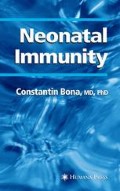Abstract
Mammalian embryos usually develop in a sterile environment because the placenta is impermeable to most macromolecules that are present in maternal blood. However, immunoglobulins (Igs), in particular the IgG fractions, are exceptional, because they can be transferred from mother to fetus through the placenta. After birth, IgGs along with secretory IgA (sIgA) and lactoferrin can be transferred to the nursing infant through breast milk.
Access this chapter
Tax calculation will be finalised at checkout
Purchases are for personal use only
Preview
Unable to display preview. Download preview PDF.
Editor information
Editors and Affiliations
Rights and permissions
Copyright information
© 2005 Humana Press Inc., Totowa, NJ
About this chapter
Cite this chapter
(2005). Effect of Maternal Antibodies on Neonatal B-Cell Response. In: Bona, C. (eds) Neonatal Immunity. Contemporary Immunology. Humana Press. https://doi.org/10.1007/978-1-59259-825-0_7
Download citation
DOI: https://doi.org/10.1007/978-1-59259-825-0_7
Publisher Name: Humana Press
Print ISBN: 978-1-58829-319-0
Online ISBN: 978-1-59259-825-0
eBook Packages: Biomedical and Life SciencesBiomedical and Life Sciences (R0)

